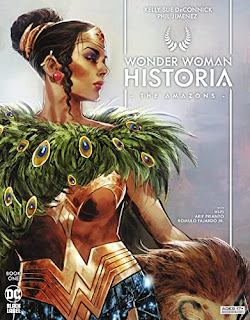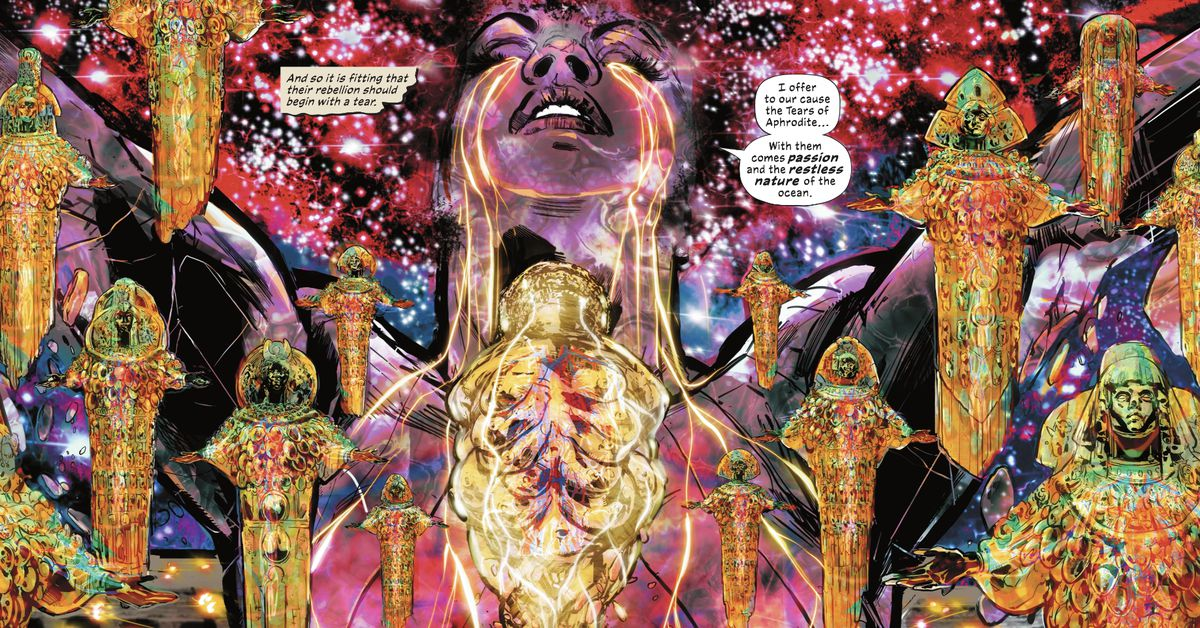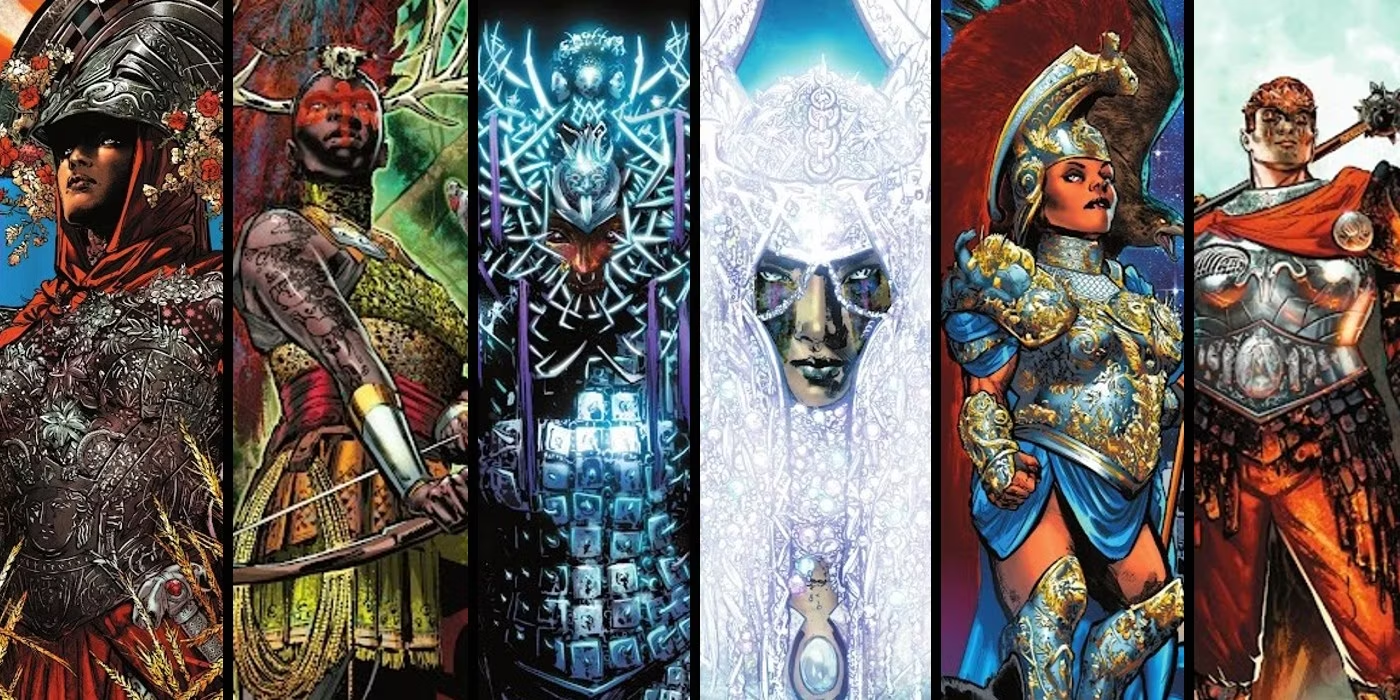A retelling of the birth of DC's Amazons, centring their perspective, and giving a view into the world of the gods.
I am not up to date on Wonder Woman in the DC comics universe more broadly. This is a review coming from a place of enjoying her in film and in the abstract, rather than a detailed understanding of her place in DC lore. With that said, Wonder Woman is one of my favourite superheroes, and one with a backstory I find neat and interesting, so when I saw that there was going to be a more or less standalone comic series on the depths of that backstory, one where I wouldn't need to try to find out exactly what lore I did and did not need to know in advance, and that it was going to be written by Kelly Sue DeConnick no less, I was absolutely there for it.
Wonder Woman Historia tells the history of the Amazons, right from not only their creation by the gods - or rather, the goddesses - but from the causes that led to that creation. It details their division into tribes, their attributes and personalities, and it details the anger that drove the goddesses to create them, their despair of the world of men and their treatment of women, their argument with the gods over this, Zeus's dismissal... and what they did in the aftermath.
Volume 1 is primarily concerned with beginnings, with the exact why and how and the different threads that led to it, it's an introduction more than a strong driving narrative. So you might think that would make it a weaker read, being as it is more of a piece of lore than a story. And yet... it works. There's a both a palpable emotion to it, especially in the way the goddesses are talked down to by a Zeus so comfortable in his power and his justice that he feels no need for diplomacy, and the way the male gods are arrayed behind him, leering with his pronouncements, but also a palpable strangeness. These gods are not just humans writ large - these are gods as the otherworldly, gods as the embodiments of strange forces. Athena is an empty shell, masked and armoured. Hecate is thorn-covered, multi-headed, more like a spider than a person. These are the gods as inhuman, in form and feeling, in how they see the world, conduct themselves. And between the strangeness and the sharp emotional resonance, it manages to be just as compelling as a more story or character driven narrative might be.
That being said, for all the comic does a great job of recognising some of the terribleness of the ancient world instead of lauding it uncritically, it is only concerned with that single axis. We see the problems faced by women, and pretty much only by women. Even when slavery is mentioned (briefly), it is as another angle of men's power over women, which ignores that slavery in the ancient world was vaster and more destructive than that one vector of oppression.
This monofocus bleeds up into the conflict at the god level - it is a story so fundamentally about women and their oppression by men, that there is little space in it for other problems, at least in this volume. Which has a strange effect in the immortal conflict of bringing together a group of goddesses who, in many of the myths, have very conflicting aims and allegiances. They, for the most part, operate as a unified front of feminism, rather than a fractured group of people who may align on this one issue, but may equally not on whatever fate throws their way tomorrow. If one wanted to be a traditionalist about it, this jars somewhat with a lot of the mythology, and beyond emphasising how bad the ancient world is for women, the comic does little to justify the changes it makes. But because it is very much focussed on the birth of the Amazons, and their existence as a force for the defence of women, this unity makes sense for the endpoint, if not the start, and so at least for me was relatively easy to overlook.
The more interesting "change" is the shift in focus on Hera - in many modern iterations, her role as the goddess of marriage, and perhaps motherhood or childbirth, is the one emphasised, and especially contrasted to her philandering husband. Wonder Woman Historia chooses instead to focus on her role as the goddess of women - it goes straight in with that in her introduction. It also gives her the gift of perfect prophecy, setting her apart from the other goddesses not just in rank but in how she views the world - she can see everything, past, present and future, all at once, and so knows how their endeavour will unfold, even as it begins. But more critically than all of that, she is not cast as a jealous wife or a bitter enemy here, as she is in so many other stories - she is a protector of women. Her role is a less active one than her fellow goddesses, but she makes her feelings no less plain in their dealings with the gods. In a time when we have so many myth retellings, with so many rehabilitations of gods who may have been overlooked in stories previously, it is rare to see Hera getting the same treatment, and for me, a welcome innovation.
The other key point of the volume is not a story one - it is simply that the art is utterly gorgeous. Reminiscent of Christian Ward's psychedelic depictions of the gods in Ody-C, Phil Jiminez's art is sumptuous and, when depicting the gods, gorgeously strange. The use of intense colour, excessive detail and more fluid and flexible page structuring heavily emphasises their inhumanity, and is by far one of the resounding triumphs of the series. And it is not only here we see that shine.
The art tells a story - a continuity of strangeness from the mundane, subdued palette and more normally spaced and structured world of humanity, up to the overwhelming saturation and complexity of the gods, with the Amazons sitting at a midpoint, with deeper, richer colours and more vibrant detail, but a paler shadow of their patron gods. They are human... but also more than human, and the art cues us to this before the story has the chance to spell it out - the two work hand in hand to build a deeper, richer world than one alone could accomplish.
And to some extent, it is for the art, more than for anything else, that Wonder Woman Historia is worth reading. The story is compelling, the lore interesting, the structure unusual and the emotions absolutely there on the page, but it is the art and its use in the world-building, and just as an aesthetic experience, that really sells this. For most stories, I find what lingers with me is a character moment, or possibly a well constructed phrase. For this, it is the vision of Hera, armed and armoured and surrounded by birds, unearthly and inhuman in her gaze, that stands strong in the memory. However good the story, it pales before the insistent presence of the art that overwhelms it.
Which leaves this a somewhat mixed review. For me - the sumptuousness of the art was sufficient, and beautifully scaffolded an already excellent story. But it could just as easily distract, and become the main focus, and for someone who wants a story that is more pacy, more driven and more narratively focussed, the need to linger on some pages, to figure out what goes where and who is who, definitely brings down the speed reading. There is simply too much on some pages to hurry. And if you want the story but to ignore the art, the experience here will be actively detrimental - the two are so necessarily entwined that you can't fully enjoy the one while sidelining the other.
But if you want to spend time luxuriating in it, and if this art style works for you? Then it's absolutely fantastic.
--
The Math
Baseline Assessment: 7/10
Bonuses: +2 gorgeous art that reflects the world-building
Penalties: -1 monofocus on oppression of women sometimes seems to conspicuously ignore other problems within the world
Nerd Coefficient: 8/10
Reference: Kelly Sue DeConnick and Phil Jimenez, Wonder Woman Historia Book One [DC, 2021]
POSTED BY: Roseanna Pendlebury, the humble servant of a very loud cat. @chloroform_tea



